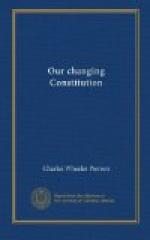How is it then, someone may ask, if the Supreme Court is so zealous in defense of the rights of the states, that those rights are being encroached upon more and more by the National Government? The answer must be that there has been a change in the popular frame of mind. The desire for uniformity, standardization, efficiency, has outgrown the earlier fears of a centralization of power. Congress has found ways, under the constitutional grants of power to lay taxes and regulate interstate commerce, to legislate in furtherance of the popular demands. The Court is not strong enough (no governmental agency which could be devised would be strong enough) to hold back the flood or permanently thwart the popular will. In a government of the people everything has to yield sooner or later to the deliberate wish of the majority.
Some profess to view the recent encroachments of federal power as a triumph of the principles advocated by Alexander Hamilton and John Marshall over the principles of Thomas Jefferson. Such a claim does Hamilton and Marshall an injustice. While they both stood for a strong National Government, neither of them contemplated any encroachment by that government on the principle of local self-government in local matters or the police power of the states.
Marshall in one of his most powerful and far-reaching pronouncements in support of the national supremacy[1] speaks of
that immense mass of legislation, which embraces everything within the territory of a state not surrendered to the General Government;... inspection laws, quarantine laws, health laws of every description ... are component parts of this mass.
[Footnote 1: Gibbons v. Ogden, 9 Wheat., 1, 203, 208.]
Later in the same opinion he refers to
the acknowledged power
of a state to regulate its police, its
domestic trade, and
to govern its own citizens.
... The power of
regulating their own purely internal affairs
whether of trading or
police.
Hamilton devotes an entire number of the Federalist[1] to combatting the idea that the rights of the states are in danger of being invaded by the General Government. In another place[2] he returns to the idea
that there is greater
probability of encroachments by the
members upon the federal
head, than by the federal head upon
the members
and concludes that it is to be hoped that the people
will always take care
to preserve the constitutional
equilibrium between
the general and the state governments.
[Footnote 1: Federalist, Number XVII.]
[Footnote 2: Id., Number XXXI.]
That hope has failed of realization. The “constitutional equilibrium” of which Hamilton wrote is not being preserved. Some will say that this is an age of progress and we are improving upon Hamilton. Others, however, think we are forgetting the wisdom of the Fathers.




